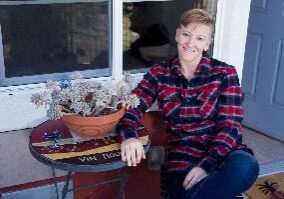Residential Treatment for Bipolar Disorder
Skyland Trail offers residential treatment for bipolar disorder as well as a day treatment program for bipolar disorder in Atlanta.
As one of the best bipolar treatment centers, Skyland Trail provides structured, evidence-based care for adults with bipolar disorder. Adult clients receive expert psychiatric care to resolve symptoms of bipolar mania and bipolar depression.
As our clients' bipolar symptoms are resolved through medication and psychotherapy, they can focus on developing the skills they need to achieve their goals, whether returning to school or work or enjoying meaningful relationships.
We recognize that your diagnosis is important; it helps us match you with the best evidence-based psychiatric treatment and the best specialized expertise to improve your mental health. But we also recognize that you are so much more than a diagnosis. Our treatment team will help you discover a path to mental wellness - one that is uniquely your own.
Structured Weekly Schedules for Bipolar Treatment Include
One-on-one sessions with a psychiatrist
A dedicated psychiatrist will help find a medication strategy for bipolar disorder (and other co-occurring disorders) that works for you. Medications are essential and effective in controlling symptoms of bipolar disorder. While there is no one recipe for success, as a top treatment center for bipolar disorder, our psychiatrists are all skilled at developing an effective medication strategy for each client, one that improves mood, concentration, and energy; prevents manic episodes; and minimizes side effects.
One-on-one sessions with a therapist
Clients are matched with a dedicated therapist with specialized experience in treating bipolar disorder
24/7 Residential Support
Help with restoring healthy sleep, meal, and hygiene routines
Healthy Eating and Active Living
As a holistic bipolar treatmenter center, our multidisciplinary treatment team includes a dietician and personal trainer to help clients adopt a whole person approach to health
Art, Music, and Nature Therapy
As part of our treatment center for bipolar disorder, we offer hands-on groups led by experts that help clients explore strategies for self care and self expression
Skills and Education Groups
Learn about your disorder and skills for preventing and managing manic and depressive episodes
Peer Support & Specialized Groups
Specialized groups support clients who identify as LGBTQ or BIPOC as well as clients in similar stages of life or with similar challenges, for example clients who are parents, clients who are experiencing grief or loss, or clients working toward sobriety.
Client Experiences
Evidence-based Treatment for Bipolar Disorder
Skyland Trail is not a "one-size-fits-all" mental health treatment facility. Each client begins with a robust diagnostic assessment at admission. And we match each client with a specialized treatment team, recovery community, and weekly schedule based on their diagnoses, challenges, and goals.
Clients with bipolar disorder often are assigned to our Cognitive Behavioral Therapy (CBT) specialized recovery community.
Cognitive behavioral therapy, or CBT, is an evidence-based therapy proven to be effective in treating bipolar disorder. CBT therapy focuses on understanding how your thoughts, behaviors, and mood are connected. Patients who engage in CBT learn strategies to improve their mood – how they feel – by changing their thought and behavior patterns.
CBT therapy can help people recognize thoughts and behaviors that may signal that an episode of depression or mania is developing. CBT empowers clients to use learned skills and strategies to prevent or mitigate the mood episode. Through CBT, people also often are able to identify strengths and personal assets they can use to navigate mood episodes and prevent relapse or hospitalizations.
Clients with co-occurring borderline personality disorder may be assigned to the dialectical behavior therapy (DBT) recovery community. DBT also may be appropriate for clients with bipolar disorder who struggle with emotion regulation, self-harm, or frequent suicide attempts.
DBT progresses through four key modules: emotion regulation, interpersonal effectiveness, mindfulness, and distress tolerance.
DBT helps clients learn skills to manage intense emotions, stress, and challenging situations to live a "life worth living."
Some people who have bipolar disorder also experience psychosis. Young adults may experience a first episode of psychosis (FEP) as part of a manic episode. Medication is critically important for psychosis because everything gets worse every next day someone lives with untreated psychosis.
Clients experiencing psychosis as part of bipolar disorder likely will enter the cognition and first episode (CAFE) recovery community. Once the psychosis is resolved through medications and therapy, clients may transition to the cognitive behavioral therapy (CBT) recovery community if clinically appropriate.
All clients experiencing psychosis participate in computer-based cognitive training to prevent cognitive decline and improve executive functioning.
Several studies show that more than 40 percent of individuals with a bipolar diagnosis also experience symptoms of substance use disorder. We call this having a dual diagnosis or co-occurring disorders. Co-occurring diagnoses can make recovery more challenging. But research indicates that people who address multiple psychiatric diagnoses simultaneously experience better long-term outcomes than those who try to address each diagnosis separately.
While Skyland Trail clients with bipolar disorder participate in a recovery community focused on their mood disorder or psychosis, clients with co-occurring substance use disorder also participate in the dual diagnosis recovery community. Clients who may have been using alcohol or substances as a coping mechanism to deal with the symptoms of their bipolar depression or mania learn new strategies and skills to regulate their mood, cope with stress, and stay healthy without relying on substances.
Trauma – particularly when experienced in early childhood – is very predictive of developing all mental illnesses, including bipolar disorder. Skyland Trail practices trauma-informed mental health care. Trauma-informed care allows trauma survivors to first address the symptoms of a diagnosed mental illness like bipolar disorder before processing their trauma.
Throughout treatment, care providers acknowledge that the client has experienced trauma and validate the emotions arising from that experience. But the treatment team does not ask the client to describe or re-live the trauma in any way. Treatment strategies are focused on helping the client develop skills to handle difficult emotions and stressful situations in healthy ways.
Completing trauma-informed psychiatric treatment for bipolar disorder allows clients to develop insight, adopt skills, and build a strong foundation for healthy living. Clients who are trauma survivors are then better prepared and equipped to pursue formal trauma treatment with a specialized mental health provider.
Some clients with a history of trauma may be assigned to additional groups focused on addressing "stuck points" related to their trauma that are preventing them from making progress in therapy. These groups use an evidence-based approach called Cognitive Processing Therapy (CPT), which is a type of CBT.
CBT for Bipolar
Skyland Trail psychiatrist Dr. Mary Burns describes cognitive behavioral therapy (CBT) and how it is used to treat bipolar disorder
Age Appropriate Treatment for Bipolar Disorder
Bipolar disorder symptoms frequently show up in older teens and young adults. Leaving home after high school can bring on new situations and stress that can trigger symptoms, as can early use of alcohol or substances.
Early treatment of bipolar disorder can improve long-term outcomes. Young adult clients reside at the Rollins Campus or South Campus, have a private room and private bathroom, and receive 24/7 nursing support. Clients benefit from a welcoming peer community of people their own age navigating similar challenges.
Young adult and college-age clients with bipolar disorder receive support in exploring their identity, values, strengths, and interests as resources for staying healthy. Group and individual work helps younger clients work toward independent living. Family therapy is available that may help clients make progress in these areas.
Life transitions can affect how adults experience bipolar symptoms. Loss of relationships, grief, career transitions, and biological changes all can affect both mania and depression.
Our bipolar residential treatment program is appropriate for midlife and older adults with chronic bipolar symptoms or midlife or older adults who experience a serious episode of bipolar depression or mania after many years without severe symptoms. Clients reside in private rooms with private bathrooms.
The Skyland Trail mental health day treatment program may be appropriate for adults with treatment-resistant depression related to bipolar illness who are not making progress in traditional outpatient therapy.
Weekly schedules include groups that address life transitions and concerns common to midlife and older adults.
Holistic Mental Health Treatment
Skyland Trail is a holistic bipolar treatment center. In addition to medication and therapy, through our horticulture, arts and music programs, individuals can build confidence, identify and externalize potentially difficult feelings, and address symptoms through creative expression and social interaction. We provide education about the increased risk for medical diseases and help prevent those diseases through our primary care and wellness program.
Adult clients in our holistic treatment facility for bipolar disorder have the opportunity to explore potential spiritual resources through interfaith spiritual counseling. And, because an important part of therapy for individuals with bipolar depression is shifting their focus outside of themselves, our clients participate in organized humanitarian efforts and in our vocational services program to set and work toward goals for school, work, or volunteer activities.
Your treatment team may recommend that you participate in family therapy, psychological testing, biofeedback, cognitive training, or transcranial magnetic stimulation.
FAQs about Residential Bipolar Treatment
The Skyland Trail bipolar residential treatment program is a welcoming, healing community for all genders. Individuals looking for a bipolar residential program for women, a residential treatment facility for men with bipolar, or a welcoming community for transgender or gender nonbinary individuals struggling with bipolar disorder will all find a welcoming treatment community at Skyland Trail.
The residential program includes more than 125 groups each week. Most groups are appropriate for people of all genders and ages. Some groups offer support and skills specialized by gender, identity, or life stage. Specialized groups include mens group, womens group, LGBTQ peer support, and BIPOC peer support.
In the mental health community, "inpatient treatment for bipolar" typically refers to a hospital or locked acute care facility.
Skyland Trail is not a hospital. Our residential bipolar treatment program in Georgia is a voluntary, unlocked private facility.
But many patients think of us as an inpatient bipolar treatment program because our patients stay with us on campus for a period of time and receive 24/7 care and support. They reside in private rooms with private bathrooms for about 2 to 4 months. Our residential treatment campus includes gardens and welcoming spaces for recreation and connecting with the people in your treatment program, as well as family and friends.
The goal of bipolar residential treatment is to help adults return home to their families and communities. Clients receive support to adopt an effective medication strategy and learn skills to stay healthy long-term.
Clients looking for a holistic, inpatient bipolar disorder treatment program may find the right fit at Skyland Trail. Clients and families considering treatment are welcome to schedule a tour of our campus with an admissions team member.
The typical length of stay in our residential bipolar treatment program is about 2 to 4 months. Residential clients typically step down to our day treatment program for bipolar after about 4 to 6 weeks.
While Skyland Trail is a long-term program for bipolar recovery, our goal is to help our clients heal and return home.
The term "rehab" can mean a lot of things. In the mental health community, the term "rehab" typically refers to substance use or addiction treatment programs. In the medical community, someone with a broken ankle or broken hip might stay at a rehab facility to receive physical therapy and to gain strength before returning home.
So while Skyland Trail is not technically a "rehab" by either of those definitions, our bipolar residential treatment program serves a similar role in helping a patient feel better, change behaviors, build strength, and learn to live a healthy life with a bipolar diagnosis. Patients looking for a bipolar rehabilitation center will find the expert psychiatric care and holistic bipolar treatment they need at Skyland Trail.
Skyland Trail also offers a dual diagnosis program for adults with bipolar disorder and co-occurring substance use.







